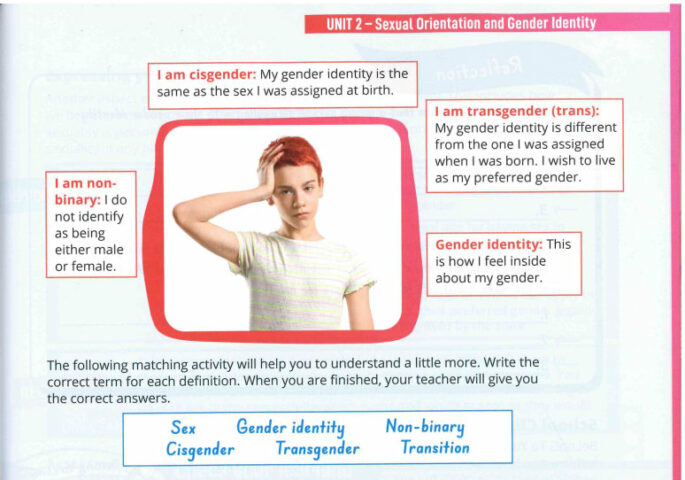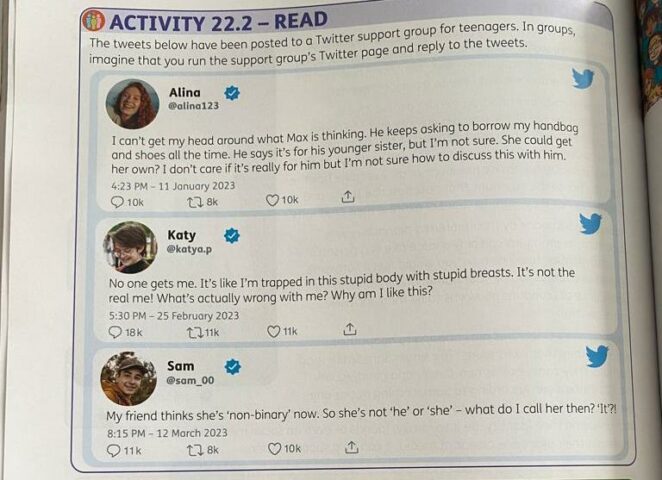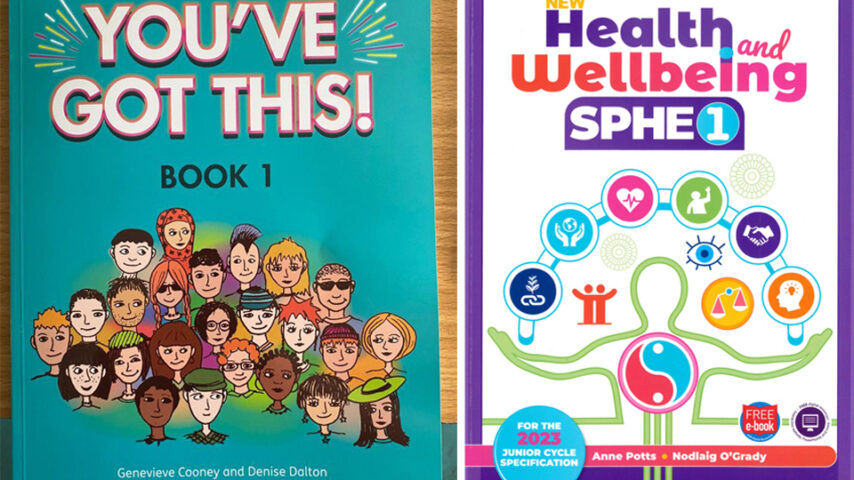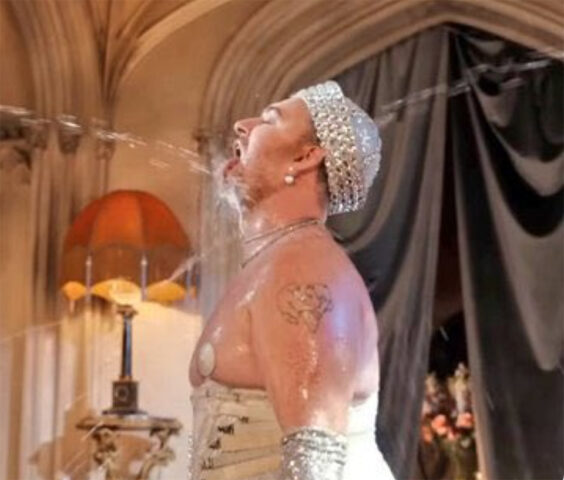Parents and educators have hit out at new SPHE workbooks produced for first year students (12 and 13-year olds) which they say contain classroom activities which will “force” students to agree with gender ideology, even though it has been described as “unscientific” and they believe it is “potentially harmful to children”.
In the draft workbooks seen by Gript, first year students are obliged to say that gender identity is separate from sex – the only correct answer given in the school exercise.
They are told that their sex is “assigned at birth”, but that they can decide their own gender – and students are told to undertake ‘matching activities’ where people not feeling gender confusion are described as ‘cisgender’.

Page 163, ‘Health and Wellbeing SPHE 1″: Edco
STUDENTS COMPELLED TO AFFIRM
In the draft workbooks seen by Gript, first year students are also asked to advise other young people regarding gender confusion – with the possibility of sex change implied.
“The tweets below have been posted to a Twitter support group for teenagers,” 12 and 13-year olds are instructed. “In groups, imagine that you run the support groups Twitter page and reply to the tweets.”
Amongst the messages that First Year students are supposed to respond to are a girl who describes her body as being “stupid” with “stupid breasts”.

Page 126, ‘You’ve Got This’. Educate.ie
Deirdre Stewart from the Kerry Parent’s Rights Alliance said that parents had been ignored by the Minister for Education, Norma Foley, and the national curriculum authority, the NCCA, on teaching gender ideology in schools.
“Our concern is for our children and for all children, it’s up to us to protect them from harm and how this is being presented is harmful. Students should have space to ask questions, not be given ideology as a fact,” she said.
“I have grave concerns over the psychological impact of these books,” Ms Stewart said, noting that well-known psychotherapist Stella O’Malley had described the theory being taught as “unscientific”.
One SPHE teacher with the Irish Education Alliance described the content as “horrendous”.
“It feels like an anti-woman, anti-female thing to include,” she said. “Its not helping girls – or boys – to appreciate and love their gender, to be happy and comfortable in their own bodies.”
“The workbooks are written in such a way as to as affirm gender ideology,” she said. “If we are to address gender confusion why not give students the full picture? Why are they not told about the mistakes that have been made in treating children, or about detransitioners? We are told to equip children with skills to make informed decisions but this is just brainwashing.”
“Teachers are already experiencing rising levels of anxiety and depression amongst students and insisting that children must agree with this unscientific, harmful ideology is not going to help,” she said.
Some people are “genderless”, first year students will be told, and “people can choose from many terms and definitions they think represents their gender identity.”
Another activity tells first year students to watch a video which tells them that they must recognise the difference between gender and sex, and that “people can move throughout the gender scale freely”.
Students then have to answer questions in groups – an exercise some parents believe will lead to any child who disagrees possibly facing bullying or even correction from a teacher.
At no point is it explained to first year students that transgender ideology is a theory which is contested – nor are students told that where gender confusion presents in childhood it resolves naturally in time in the vast majority of cases.
An investigation by journalist Hannah Barnes into the now-disgraced Tavistock clinic in the UK found that it “ignored evidence that 97.5 per cent of children seeking sex changes had autism, depression or other problems that might have explained their unhappiness”.
Critics of the policy to teach transgender ideology as fact in schools point to evidence of social influence driving the rocketing rates of children seeking to change gender, with the controversial ‘gender-affirming’ approach now increasingly seen as potentially harmful after scandals such as that with the Tavistock Clinic in Britain saw vulnerable children rushed onto a medical pathway which led to irreversible treatments including surgeries such as mastectomies and penis removal.
The previously careful approach to gender dysphoria, which saw clinicians undertake a cautious approach and consider other difficulties impacting the child such as autism, depression or abuse, was upended partly in the rush to affirm gender ideology – insisting that gender rather than sex was what mattered, and normalising confusion about sex and gender.
GENDER DYSPHORIA NOT THE NORM
Campaigner Jana Lunden said that parents should be aware that first year students would be obliged to affirm transgender ideology, with workbooks set for September of this year – compelling school children to agree that sex and gender are two different things, and that gender identity is felt “regardless of sex registered at birth.”
“The emphasis in these workbooks is on the experience of a very small minority of students, but that is presented as the norm,” the founder of the Natural Woman’s Council said.
“Gender dysphoria, where a person genuinely feels they want to change sex, is thankfully a very rare disorder – or at least it was. Now, in very large part due to social contagion, we’re seeing the number of children and young people saying they want to change sex rocketing, with some horrifying consequences.”
“Parents need to understand that putting children on this path can lead to irreversible outcomes for very vulnerable teens and young people. Puberty blockers, cross sex hormones, surgery removing sex organs: the rush to normalise any of this is deplorable,” she said.
“Someone in authority forcing children to believe something that is not real – and is not based on science or biological facts should not be part of the school curriculum,” she said.
“Children should be taught to love their body, and young women, in particular, should never have negative feelings about their body re-affirmed. Twelve year olds are particularly vulnerable to confusion and negative feelings about their body,” she said.
“Gender dysphoria is listed as a psychiatric condition by medical authorities. Would a teacher ever tell a child with anorexia that gastric bands are a solution, or that its valid to hate your body in that context,” she asked?
“Vulnerable children are being taught that gender is fluid. Will this influence them to believe they can change their bodies, with outcomes that can be absolutely devastating?” she asked.
“Elsewhere, teens have been put on puberty blockers and cross-sex hormones, and we now know that transgender activists who insisted those actions were reversible were wrong. In fact, they may compromise bone health, their fertility, they may be left unable to ever have an orgasm,” she said.
Studies indicate that most cases involving children who present with gender dysphoria resolved naturally in time – this is absent from the workbooks.
“Where is the evidence parents or students or teachers want this potentially harmful material taught to children – to students in first year?” Ms Lunden asked.
“A radical minority are pushing this on the majority. We’re seeing social contagion already from TikTok and cultural influences – pushing gender ideology is a very risky pathway for schools.”
SAFEGUARDING CHILDREN
“A principal’s job is to safeguard children in the school,” Ms Lunden said. “I believe that forcing children to affirm potentially harmful material in school is a breach of a safeguarding duty.”
Deirdre Stewart asked if first-year students would be thought of as “transphobic” if they disagreed with gender ideology or said that they believed there were two genders.
“Most teachers are parents and they are afraid to speak out – and most parents don’t know what’s in these lessons, it’s being hidden from them,” she said. “Parents trust the school.”

She said that Ireland was ignoring the experience of other countries and “going full steam ahead here” despite the alarm bells that should be ringing as a result of the Tavistock scandals and others.
“Look at Sweden, they are rowing back as they see the need for caution now, but we are going full steam ahead here,” she said. “I see Charlie Flanagan speaking up and asking questions. He is dead right to be concerned, but Norma Foley won’t even meet with parents in Kerry.”
In Britain, guidelines for doctors have been revised significantly in light of a major review – the Cass report – which found services being offered to children with gender dysphoria were unsafe.
A new draft reminds doctors that most children may simply be going through a “transient phase” when they say they want to change sex.
Moreover, the guidelines caution medical practitioners to adopt a ‘watchful approach’ towards children and to be mindful of the possibility of autism and other mental health conditions.
And they are reminded that it is not a “neutral act” for healthcare practitioners to facilitate children who want to transition socially by using their preferred new names or pronouns without consideration of other factors.
The assertions made about gender identity in the Irish schools workbooks may “distress children who may not conform to gender stereotypes,” a new leaflet which the Parents Rights Alliance is distributing says.
“If a boy is feminine or a girl is masculine, it does not mean they were born in the wrong body.
One of the workbooks also holds singer Sam Smith, who is non-binary – and whose hyper-sexualised videos feature sado-masochistic themes, orgies, and urine showers – up as a role model.

Still from Sam Smith video:
First year students are also told to research and write a presentation on transgender and non-binary celebrities, Jonathan Van Ness and Elliot Page – the only instances where they are asked to research a living person in the workbook.
The NCCA AND MINISTER FOLEY
The national curriculum authority, the NCCA ,has come under fire for seeming to ‘deliberately downplay’ the fact that the “vast majority” of submissions made by parents on proposed new sex-ed classes were “strongly opposed to teaching transgender ideology and porn in schools.”
Parents groups claim that “thousands of parents who made their voices heard to the consultation process on the curriculum were ignored and dismissed” while “undue emphasis was given to a select group of NGOs and individuals whose views are radically at odds with parents.”
4,353 parents are on record as responding to the National Council for Curriculum and Assessment consultation, while there were written submissions from another 55 individuals – and emails/letters from 317 individuals.
Parents made by far the most submissions – by a factor of ten to one – to the consultation.
Groups such as the Parents Rights Association and the Irish Education Alliance say that thousands of parents had contacted them to make submissions because they were opposed to teaching school students that ‘gender is a spectrum’, along with concerns that porn literacy would be taught in class; and that too much ‘early sexualisation’ of children was becoming a trend in the NCCA’s direction on sex-ed.
“The vast majority of those 4,353 submissions are from parents opposed to the changes favoured by the NCCA, yet the body was openly dismissive of parents – and even included in their report to the Minister the idea that parents would not have the right to remove their children from these new RSE classes,” the parents’ group said.
The NCCA has refused to give Gript a breakdown on the submissions received by parents – and it has also refused to name the nine experts within the HSE referenced in the report who were consulted in writing the draft report on the new curriculum.
Minister Norma Foley’s office, and both Edco and Educate.ie, were contacted for comment on this story.
UPDATE at 08.06.2023,16.43: The Department of Education said that they do “not review, approve or endorse the content of textbooks published by private companies, as this may be seen as an indication of approval for their use in schools. Any concerns regarding material published in textbooks should be raised with the publisher themselves.”
“Schools must deliver the curriculum as set out by the National Council for Curriculum and Assessment (NCCA), which is made up of representatives the partners in education, industry and trade union interests, parents’ organisations, the student voice and other educational interests. Online toolkits are published by the NCCA, to support teachers in teaching SPHE at each stage of learning, and are found on curriculumonline.ie.”
“Across all three toolkits (Primary, Junior Cycle and Senior Cycle) one of the three sections is entitled ‘resources for learning and teaching’. The resources presented in the toolkits aim to provide a range of relevant materials for teachers to support teaching and learning in SPHE. Each resource should be considered by teachers with respect to the needs and interests of children, their parents, the wider school community, and a school’s SPHE and RSE policies, and are not intended as exhaustive or prescriptive,” they said.